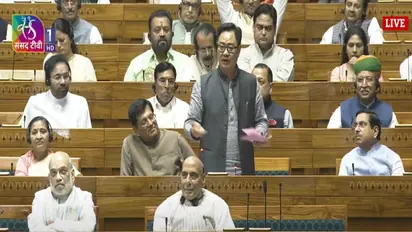Amid Opposition showdown, Waqf amendment bill tabled by Union Minister Kiren Rijiju in Lok Sabha (WATCH)

Synopsis
The Waqf (Amendment) Bill 2024 has been tabled in the Lok Sabha. Union Parliamentary Affairs Minister Kiren Rijiju moved the bill, which aims to amend the Waqf Act of 1995. Both the Bharatiya Janata Party (BJP) and Congress issued whips to ensure their MPs' presence for the vote, signaling the importance of the legislation.
The Lok Sabha on Wednesday took up the Waqf (Amendment) Bill, 2025, and the Mussalman Wakf (Repeal) Bill, 2024, for consideration and passing. Minority Affairs Minister Kiren Rijiju moved both bills, emphasizing that the amendments were based on recommendations from the Joint Parliamentary Committee (JPC) that examined the bill tabled in August last year.
Both the Bharatiya Janata Party (BJP) and Congress issued whips to ensure their MPs' presence for the vote, signaling the importance of the legislation.
Also read: Waqf Amendment Bill in national interest, opposition driven by politics: Kiren Rijiju
Congress leader KC Venugopal accused the government of rushing the legislation without allowing enough time for amendments, while Home Minister Amit Shah asserted that the amendments were approved by the Union Cabinet and aligned with the JPC report.
Rijiju defended the bill as being in the national interest, dismissing opposition as politically motivated.
The outcome of the bill's passage is set to be determined by the majority numbers in the House, amid the showdown between the ruling BJP-led National Democratic Alliance and the opposition INDIA bloc. After being introduced, the bill is set to be be passed following a detailed 8-hour discussion in the Lok Sabha.
The bill, first presented in August last year, was reviewed by a Joint Parliamentary Committee (JPC) led by BJP MP Jagdambika Pal. The primary aim of the bill is to address long-standing challenges in regulating and managing Waqf properties in India.
On August 8, 2024, two bills, the Waqf (Amendment) Bill, 2024, and the Mussalman Wakf (Repeal) Bill, 2024, were introduced in the Lok Sabha with an aim to streamline the Waqf Board's work and ensure the efficient management of Waqf properties.
Also read: Waqf Amendment Bill a historic day for poor and Pasmanda Muslims: BJP MP Jagdambika Pal
The amendment seeks to improve the administration and management of Waqf properties, focusing on enhancing the efficiency of Waqf boards. Changes include renaming the Act, updating the definitions of Waqf, refining the registration process, and incorporating technology for better management of Waqf records. The 1995 Waqf Act has faced criticism for issues like mismanagement, corruption, and encroachments, which the amendment aims to rectify.
What is Waqf and the Waqf Amendment Bill?
Waqf refers to a charitable endowment under Islamic law, where a person donates property for religious or social welfare purposes, ensuring it remains inalienable and used for the community’s benefit.
The Waqf Act, 1995, regulates such properties in India, with Waqf Boards overseeing their management. The Waqf (Amendment) Bill, 2024, seeks to improve the administration and governance of waqf properties by addressing loopholes in the existing law.
It aims to streamline the registration process, enhance transparency, and incorporate technology in record-keeping to prevent mismanagement and disputes.
Stay updated with the Breaking News Today and Latest News from across India and around the world. Get real-time updates, in-depth analysis, and comprehensive coverage of India News, World News, Indian Defence News, Kerala News, and Karnataka News. From politics to current affairs, follow every major story as it unfolds. Get real-time updates from IMD on major cities weather forecasts, including Rain alerts, Cyclone warnings, and temperature trends. Download the Asianet News Official App from the Android Play Store and iPhone App Store for accurate and timely news updates anytime, anywhere.